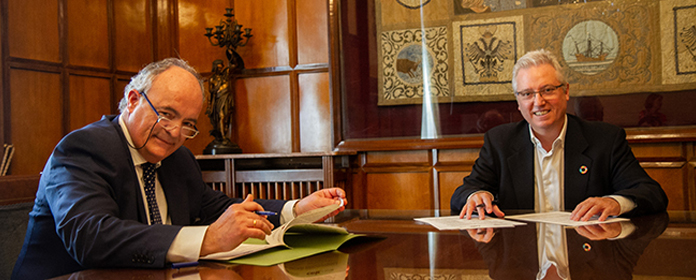News & Events
Environment and Ceit will collaborate to promote the Cicular Economy in Gipuzkoa
The Department of the Environment and the Ceit Research Center sign a collaboration agreement for R + D + I on the biomethanization of secondary waste, in order to promote the Circular Economy strategy of Gipuzkoa.

The deputy for the Environment of Gipuzkoa, José Ignacio Asensio, and the manager of the Ceit Research Center, José Ignacio Terrés, have signed a collaboration agreement to open an R&D line that will work with waste generated by the Ekogras company ; company dedicated to the recovery and recycling of waste, and especially known for its work in the field of recycling household oil.
Both the Ceit technology center, a member of the BRTA alliance, and Ekogras, belong to the Recycling Cluster, GK Recycling, so this agreement also includes a collaboration between companies in that group. Thus, the circular economy in Gipuzkoa is promoted, analyzing the recovery and treatment of waste for its subsequent use in different industrial processes. These initiatives are contemplated in the current waste planning, since the PIGRUG 2019-2030 includes this type of actions in its recycling program. In this regard, the deputy of the Environment José Ignacio Asensio, has indicated that "research in green technologies is a key factor in positioning Gipuzkoa with the European Green Deal policies, promoting the circular economy and job creation."
In this line of research, Ceit will carry out a detailed analysis of the technical-economic viability of the recovery of secondary waste from Ekogras. The objective is to look for synergies between the current valorization that Ekogras carries out with the used oil, with the opportunities that arise from the new residual currents such as coffee by-products. This valorization is being generated thanks to the Kafea Project capsule collection and recycling project, in which the Provincial Council of Gipuzkoa, the City Council of San Sebastián, Ekogras and Lavazza participate.
Ceit will combine laboratory experimentation through biomethanisation tests of the coffee by-product, with simulation tools that allow exploring different scenarios and optimizing the entire process. The study will focus on this by-product, and the sludge obtained from the wastewater, the solid residue from the oil filtrate and the oil collected at Ekogras will be considered as secondary currents. The study will combine an experimental part with an optimization carried out through mathematical modeling, identifying the optimal process conditions and the possible waste mixtures that will maximize the production of biomethane.
The provincial manager, José Ignacio Asensio, explained that biomethanization is already a reality in Gipuzkoa, which already has a plant in the Gipuzkoa Environmental Complex (CMG-2). "Through this waste treatment system, energy is obtained from the combustion of methane gas that is generated under anaerobic conditions. It is a technology with significant potential for other waste streams that are generated in different sectors of the Gipuzkoan economy, "said Asensio.
The director of the Ceit Water and Health Division, Enrique Aymerich, has stated that it is essential to promote these public-private collaboration schemes between public institutions, research centers and companies, if we want to make Gipuzkoa become a benchmark of the Circular Economy. The present agreement aims in this line: it combines the needs of a GK Recycling company to open new business lines, with Ceit's experience in the field of the valorization of organic by-products, specifically in biomethanization.
In the development of the Ceit agreement, it is first considered to analyze the composition of the waste streams that can be recovered, namely, the coffee by-product, the sludge obtained in the waste water, the solid residue from the oil filtering and the oil collected from Ekogras. For this, the characterization of the waste will be carried out. Secondly, tests will be carried out to assess the biomethane production potential of the aforementioned wastes. In addition, Ceit will develop and calibrate a mathematical model capable of simulating the biomethanization process of the coffee by-product and the rest of the aforementioned residues. The model will allow evaluating the effect that the mixture of waste has on the production of biogas, allowing the biomethanization process to be optimized.
The data obtained through simulation will be validated by laboratory tests, where different mixtures of residues will be tested and the production of biomethane will be monitored. Finally, an analysis of the energy potential will be carried out to enhance the coffee by-product, where the potential of the proposed solution and the possibility of integrating biomethanization as a treatment technology in Ekogras will be studied.